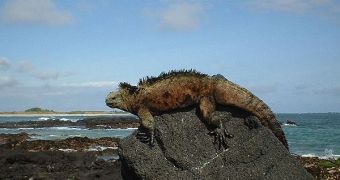The Galapagos Islands, some of the most famous in the world, have already been drastically altered by global warming and human activity. Their marine ecosystems have been destroyed by artificial structures, overfishing, and the introduction of sea urchins that destroy coral reefs, and there isn't much that anyone can do about that. This case again emphasizes the importance of preventing the effects of global warming and climate change, experts say, quoted by the BBC News.
The 1982 El Nino atmospheric event also took a heavy toll on the islands, scientists say. In the time frame since the Galapagos have been under observation, more than 45 native species have gone extinct as a direct result of the aforementioned activities, with many more being in danger of disappearing entirely over the coming years. The really bad news is that the future impact of global warming, which nations seem unwilling to mitigate, will strike these world treasures a lot harder than they will other regions. Analysts compare their situation to the state of a patient with a weakened immune system, which is more prone to catching other diseases.
Behind the new investigation were experts from the Ecuadorian Ministry of the Environment, the Galapagos National Park Service, as well as from environmental and wildlife groups, such as Conservation International and the WWF. Details of the work are published in the latest issue of the respected scientific journal Global Change Biology and provide ample evidence. All of the conclusions have already been discussed at a scientific meeting between all the parties involved in the research. One of the most devastating actions that were undertaken in the area fall in the responsibility of local fishermen.
They gathered so many large predatory fish and lobsters from the seas, that they set the stage for a massive sea-urchin invasion that destroyed the part of the reefs that remained following the devastating El Nino event. They also overgrazed the coral reefs, further preventing them from growing. “The Galapagos, the Rosetta Stone of evolution, is now teaching us about the far-reaching impacts of climate change on ocean ecosystems,” Boston University Professor Les Kaufmann, a coauthor of the report, explains.
“Nowhere on Earth are the combined impacts of climate change and overfishing more clearly defined than in the Galapagos Islands. Decades of data link recent fishing pressures to disruption of the islands' fine-tuned systems, making them more vulnerable to natural, and anthropogenic changes in climate,” US National Geographic Society scientist Sylvia Earle, also a paper coauthor, concludes.

 14 DAY TRIAL //
14 DAY TRIAL //